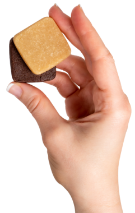You might be surprised, but people who follow the Mediterranean diet actually show improved cognition.

You probably have heard that the Mediterranean diet helps lower the risk of chronic disease, but you might not have heard about the possible benefits it has on cognitive function. There has been some research published that suggests that eating in line with the Mediterranean diet can improve thinking, learning, memory and other cognitive processes.
This is what you can eat now to slow the decline and even improve your cognitive health as you age.
Managing the inevitable: brain aging
As we age, remembering, thinking clearly, and learning are issues of concern but also get more difficult to maintain. It can become frustrating to try to think through how you’re going to complete something or even where you left the car keys. Fighting this change can be exhausting and can bring up negative feelings and thoughts. It’s best not to resist these changes but instead change what we can to ease into them. Diet is an aspect in our lives that we can often alter in a way that benefits us in many different ways.
Instead of going against the grain brain, go with it and discover a new love for foods by making changes to your diet.
The connection between the Mediterranean diet and cognitive function
A review article published in the Current Nutrition Reports journal referenced multiple research studies that supported the association between the Mediterranean diet and cognitive function. The majority of these studies found a positive association between maintaining the Mediterranean diet and improvement in cognition as well as a reduction in cognitive decline (Gardener and Caunca, 2018).
Main Food Sources of the Mediterranean DietTry some of these approaches for yourself. And remember, the key is to eat a wide variety of foods from the list below.
- Fresh fruits and vegetables
- Legumes, nuts, seeds
- Olive oil
- Frequent fish and seafood consumption
- Whole grain bread and grains
- Dairy products
- Eggs
- Water as main beverage
- Moderate wine intake
Other aspects of the diet
- Locally produced fresh foods
- Controlled portion sizes
- Spices and herbs for flavor and less salt
- Regular physical activity
- Meals eaten with others
- Red meat eaten intermittently
- Occasional desserts
(Dominguez and Barbagallo, 2018)
Give yourself permission to do self care your way. For more tips and to never miss an update, sign up for Shevolve Nutrition newsletter.







